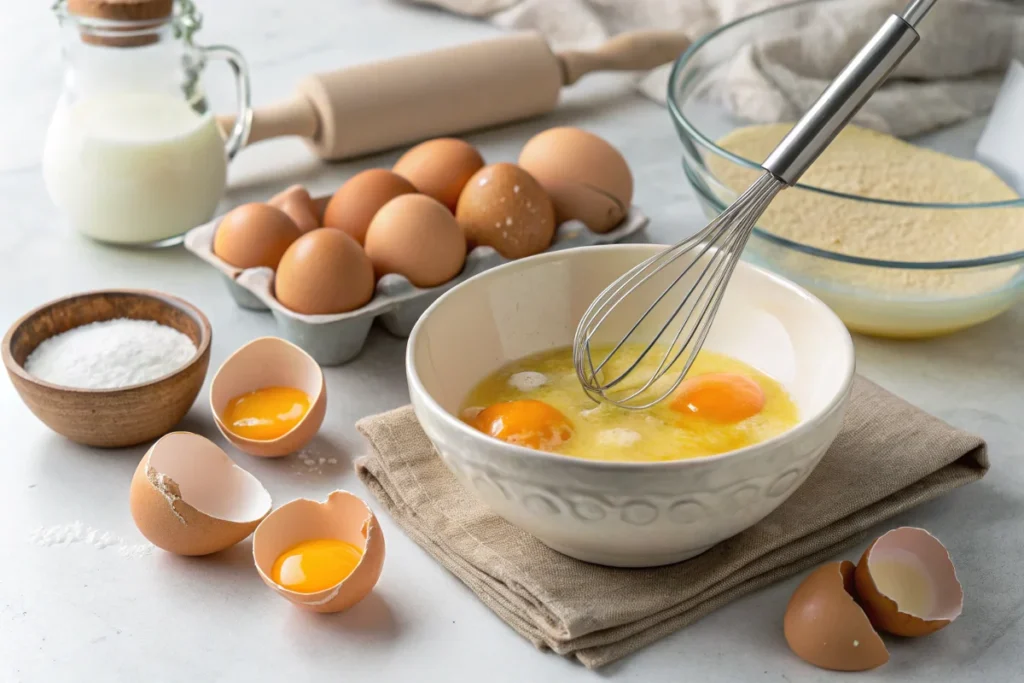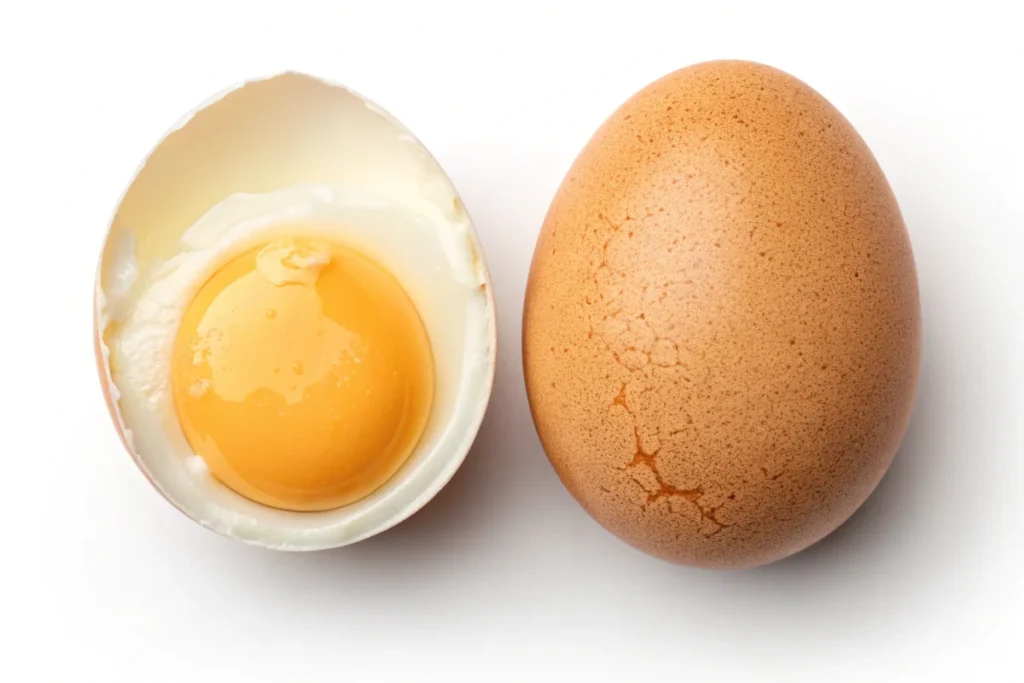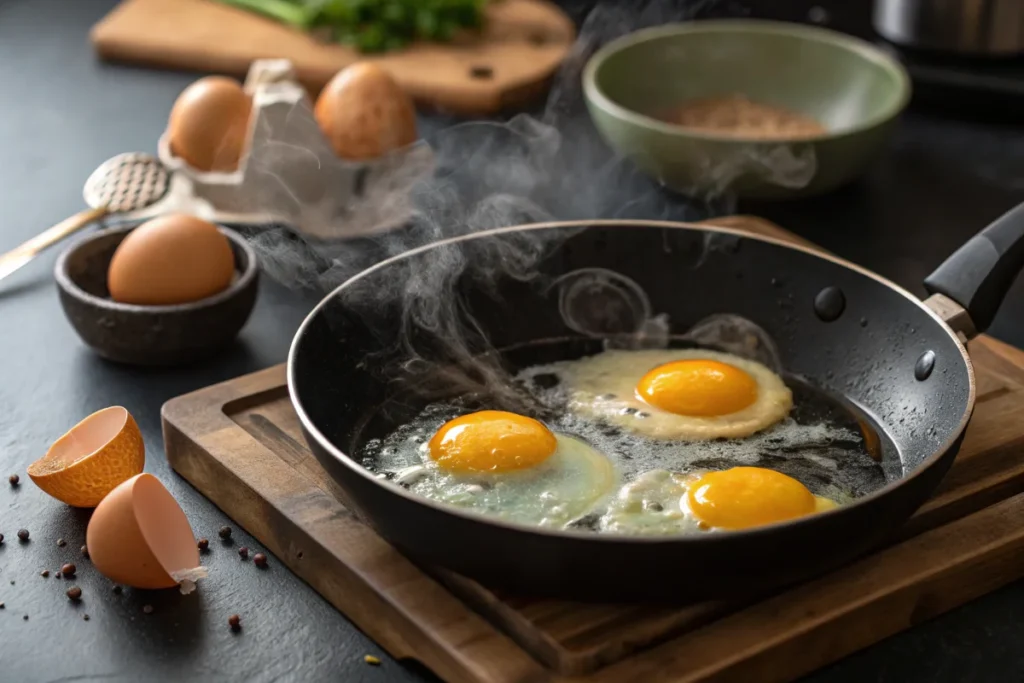Ever asked, why do my eggs come out watery? This article delves into the common causes of watery eggs and how to avoid them.
Why do my eggs come out watery? This is a common issue many people face when trying to cook eggs perfectly. In this article, we’ll explore the reasons why do my eggs come out watery, discuss common cooking mistakes that make eggs watery, and provide helpful tips for making perfect eggs. By the end, you’ll have the knowledge to improve your egg-cooking skills and avoid eggs that are watery. You will enjoy more satisfying results. If you are wondering, why do my eggs come out watery, read on.
Understanding Egg Composition and Water Content
Eggs are composed of water, proteins, and fats. The whites are mostly water and proteins. The yolks contain fats and proteins. Therefore, understanding the composition of eggs will help you learn why do my eggs come out watery. It will also help you learn why the liquid can sometimes separate. This liquid content can lead to a watery result, which is why my eggs come out watery, when not handled properly. Knowing the composition is key to understanding why eggs can be watery.
The Role of Egg Whites, Yolks, and Liquid
The white, or albumen, is made of water and proteins. The yolk contains fat and proteins. Both whites and yolks have water. The liquid can separate from the solids when heated. These components of the egg can lead to a watery final result if not cooked correctly, so that’s why do my eggs come out watery. Understanding how these components work together is essential if you want to avoid having eggs that are watery.
Common Cooking Mistakes That Lead to Watery Eggs
Many cooking mistakes can lead to watery eggs. Using too high a heat is a common issue, which is why do my eggs come out watery. Overmixing can also cause the eggs to become watery. Additionally, adding too much liquid is a problem. Therefore, you will want to avoid making these mistakes if you don’t want watery eggs. Correcting these cooking errors will improve your eggs. The texture will also improve, and you will achieve better results. This can help you prevent eggs from being watery.
High Heat, Overmixing, and Added Liquids
Using high heat can cause the water to separate too quickly, which explains why do my eggs come out watery. Overmixing also changes the protein structure, making the eggs watery. Adding too much milk or water will also dilute the eggs. These errors will result in a watery outcome. It is important to control these aspects while cooking to prevent watery eggs. You want to avoid wondering, why do my eggs come out watery?
The Impact of Overmixing on Egg Texture
Overmixing can change the structure of the egg proteins. This can cause the water to separate. The eggs then become watery and less fluffy. It also makes them less tender. Therefore, it is important to mix eggs gently, if you don’t want them to be watery. You want to mix them just enough for the yolks and whites to combine. This will prevent your eggs from becoming watery, so you won’t wonder “why do my eggs come out watery?”. This will also give them a better texture.
Breaking Down Proteins and Liquid Separation
Overmixing breaks down the structure of the proteins, which leads to watery eggs. This can cause the water to separate. Ultimately, you get a less appealing texture. Therefore, you want to mix your eggs with a light touch if you don’t want your eggs to be watery. You also want to mix them for a short period of time. This will improve the final result and prevent you from wondering, why do my eggs come out watery.
Cooking Temperature and Watery Eggs
Using the wrong cooking temperature can also result in watery eggs. High heat cooks the eggs too fast. This forces the water to separate quickly, which is why my eggs come out watery. Therefore, you want to use a lower to medium heat setting. This will allow the eggs to cook more evenly. This also reduces the amount of liquid that is released, so your eggs are less watery. Controlling the heat is essential for a great outcome and preventing watery eggs.
Lower Heat Settings for Even Cooking
Using a low to medium heat setting allows your eggs to cook slowly. This helps to prevent water from separating. The lower temperature ensures your eggs cook evenly and prevents the issue of why do my eggs come out watery. Ultimately, this gives you a better texture, and they will be more tender and delicious and less watery.
The Effect of Added Liquids
Adding liquids to your eggs, such as water or milk, can also make them watery. If you add too much liquid, the eggs become diluted. The extra liquid can then separate during cooking, which is a good reason for why do my eggs come out watery. Therefore, if you add any liquid, use it sparingly. Use as little as possible to get your desired consistency. This way you can avoid watery results, and you won’t be asking why do my eggs come out watery?

Breaking Down Proteins and Liquid Separation
Overmixing breaks down the structure of the proteins, which leads to watery eggs. This can cause the water to separate. Ultimately, you get a less appealing texture. Therefore, you want to mix your eggs with a light touch if you don’t want your eggs to be watery. You also want to mix them for a short period of time. This will improve the final result and prevent you from wondering, why do my eggs come out watery. If you find yourself thinking, why do my eggs come out watery, consider how much you mix them.
Cooking Temperature and Watery Eggs
Using the wrong cooking temperature can also result in watery eggs. High heat cooks the eggs too fast. This forces the water to separate quickly, which is why do my eggs come out watery. Therefore, you want to use a lower to medium heat setting. This will allow the eggs to cook more evenly. This also reduces the amount of liquid that is released, so your eggs are less watery. Controlling the heat is essential for a great outcome and preventing watery eggs. If you are asking, why do my eggs come out watery, check your heat setting.
Lower Heat Settings for Even Cooking
Using a low to medium heat setting allows your eggs to cook slowly. This helps to prevent water from separating and prevents the issue of why do my eggs come out watery. The lower temperature ensures your eggs cook evenly and are not watery. Ultimately, this gives you a better texture, and they will be more tender and delicious and less watery. When your eggs are watery, consider lowering your cooking temperature.
The Effect of Added Liquids
Adding liquids to your eggs, such as water or milk, can also make them watery. If you add too much liquid, the eggs become diluted. The extra liquid can then separate during cooking, which is a good reason for why do my eggs come out watery. Therefore, if you add any liquid, use it sparingly. Use as little as possible to get your desired consistency. This way you can avoid watery results, and you won’t be asking, why do my eggs come out watery?
Milk, Water, and Other Liquid Additives
Adding milk, water, or cream to eggs can make them more tender. However, too much liquid makes them watery, which is a common reason for why do my eggs come out watery. Use liquid in small amounts. Only add what is needed to get your preferred consistency to prevent watery eggs. These practices will help you have more control over the final outcome and ensure your eggs are not watery.
Freshness of Eggs and Water Content
The freshness of your eggs can affect their water content. Fresh eggs have a firmer white and yolk. They also have less water. Older eggs can have a looser white and a more watery texture. Therefore, use fresh eggs for best results. They will also offer a more delicious taste, and they will be less likely to be watery. You should always use the freshest items you can to prevent watery eggs. If your eggs are watery, freshness is a factor to consider.
Firmer Whites and Yolks in Fresh Eggs
Fresh eggs have firmer whites and yolks. The older eggs are more watery. Therefore, using fresh eggs will help prevent a watery outcome when cooking and also prevent you from asking, why do my eggs come out watery? Fresh eggs will also give you better overall results. You will have better texture and flavor by using the freshest eggs you can, and you will also prevent watery eggs.
The Impact of Cooking Time on Eggs
Overcooking your eggs can also cause them to become watery. Overcooking makes the proteins contract and squeeze out water, which is another reason why do my eggs come out watery. Therefore, it is important to cook your eggs for the right amount of time. You want to cook them until they are set, but not overdone. Proper cooking time is key to the ideal egg texture and avoiding watery eggs. Knowing the right timing will help if you are thinking, why do my eggs come out watery?
Avoiding Overcooked and Dry Eggs
Do not cook your eggs too long. Cook them until they are set, but not dry to prevent watery eggs. Overcooked eggs are also less tasty and are more likely to be watery. The correct cooking time will give you the perfect egg texture. They also should be more firm and less watery. It is essential that you pay close attention to the heat and timing if you don’t want to wonder why do my eggs come out watery.
Proper Pan Selection for Cooking Eggs
The type of pan you use will also affect the final result. A good non-stick pan will prevent the eggs from sticking. It will also help them cook more evenly. A pan that is too hot will cause them to cook too quickly. This can make them watery, which is why do my eggs come out watery. Use a pan that is appropriate for cooking eggs. This is one way to ensure your results are consistent and avoid watery eggs.

Firmer Whites and Yolks in Fresh Eggs
Fresh eggs have firmer whites and yolks. The older eggs are more watery. Therefore, using fresh eggs will help prevent a watery outcome when cooking. Fresh eggs will also give you better overall results. You will have better texture and flavor by using the freshest eggs you can.
The Impact of Cooking Time on Eggs
Overcooking your eggs can also cause them to become watery. Overcooking makes the proteins contract and squeeze out water. Therefore, it is important to cook your eggs for the right amount of time. You want to cook them until they are set, but not overdone. Proper cooking time is key to the ideal egg texture.
Avoiding Overcooked and Dry Eggs
Do not cook your eggs too long. Cook them until they are set, but not dry. Overcooked eggs are also less tasty. The correct cooking time will give you the perfect egg texture. They also should be more firm and less watery. It is essential that you pay close attention to the heat and timing.
Proper Pan Selection for Cooking Eggs
The type of pan you use will also affect the final result. A good non-stick pan will prevent the eggs from sticking. It will also help them cook more evenly. A pan that is too hot will cause them to cook too quickly. This can make them watery. Use a pan that is appropriate for cooking eggs. This is one way to ensure your results are consistent.

Non-Stick Pans and Heat Distribution
Use a non-stick pan to cook your eggs. This will allow the heat to distribute evenly. It will also help to prevent your eggs from sticking. This makes cooking easier, but also provides better results. You will want to use a good-quality pan. This can make a major difference.
Tips to Avoid Watery Eggs: A Summary
To avoid watery eggs, use a low to medium heat. Mix your eggs gently, but not too much. Do not add extra liquid if possible. If adding liquid, use it sparingly. Be sure to use fresh eggs and do not overcook them. Also, use a good non-stick pan. These steps will allow you to cook perfect eggs. You will also have a more delicious result by focusing on these aspects of cooking.
Low Heat, Gentle Mixing, and Fresh Eggs
Use a low to medium heat for cooking. Mix your eggs gently to prevent them from becoming watery. Use fresh eggs for the best taste and texture. These tips are simple. They also make a big difference in your final egg dish. Focusing on these techniques will give you the perfect eggs every time.
Different Types of Egg Dishes and Watery Results
Watery eggs can happen in many types of egg dishes. Whether you are scrambling, making omelets, or even hard-boiled eggs, you can run into this issue. Each dish requires its own proper cooking technique. This is key to avoid watery results. Understanding the type of dish is essential to avoiding this issue.
Scrambled Eggs, Omelets, and Hard-Boiled Eggs
Scrambled eggs can become watery if not handled properly. Omelets, as well, can develop a watery consistency if not cooked correctly. Even hard-boiled preparations can become watery if not prepared well. Each type of dish requires specific techniques to avoid this. Therefore, mastering the right cooking methods is essential.
Are Watery Eggs Safe to Eat?
Are watery eggs safe to eat? Yes, they are usually safe to eat if cooked to a safe internal temperature. However, their texture and taste may not be the best. Make sure your eggs are cooked properly. You can then eat them without worry. This is one of the most important aspects to consider when cooking your eggs.
Cooking to a Safe Internal Temperature
If the eggs have been cooked to a safe internal temperature they are generally safe to eat. Even if they are watery, they are still fine. However, watery eggs may not be as appealing. You will still want to ensure you are following proper cooking guidelines for food safety. It is also worth considering how to avoid watery results in the future.
Preventing Watery Eggs When Adding Other Ingredients
Adding other ingredients to your eggs can sometimes lead to watery results. For example, vegetables can release water. You should always cook your vegetables first. This will remove any excess moisture. You also may want to consider using less dairy. These are helpful practices for creating delicious eggs. You will also be able to have more consistent results.
Sautéing Vegetables and Limiting Dairy
Saute your vegetables before adding them to your eggs. This will remove any excess moisture. Also, limit dairy if you have issues with watery eggs. Too much milk, cream, or even cheese can dilute the eggs. By controlling these added items you will be better able to create perfect eggs every time.
Why are my Cottage Cheese Eggs Watery?
When using cottage cheese with eggs, the eggs may come out watery. This is a common reason for the issue, as cottage cheese has a high water content. To prevent this, always drain the cottage cheese thoroughly before adding it to your egg mixture. This is key to avoiding a watery consistency.
The Liquid in Cottage Cheese
The liquid found in cottage cheese is often the reason that your eggs will come out watery. If you don’t remove this extra moisture, the results will not be the way you expect. This will also cause your eggs to change texture. Therefore, when adding cottage cheese, make sure that you have fully drained it for the best results.
Frequently Asked Questions About Watery Eggs
Here are some common questions about watery eggs:
Why are my eggs watery?
Your eggs might be watery because you used too much heat, overmixed, added too much liquid, or overcooked them. The type of egg you use can also impact the overall water content of the final results.
What does it mean when egg liquid?
When egg liquid separates from the solids, it means the proteins have broken down. This is usually due to improper cooking methods. Also, if your eggs are old, they can have a more watery texture as well.
Are watery eggs safe to eat?
Yes, watery eggs are generally safe to eat if they are cooked to a safe internal temperature. However, their texture may be less desirable. And you may not find them as satisfying.
Why are my cottage cheese eggs watery?
Your cottage cheese eggs may be watery if you did not drain the cottage cheese. Also, if you use low heat, overmix, or overcook them, this may also impact the final result.
Conclusion: Preventing Watery Eggs
In conclusion, the issue of why do my eggs come out watery stems from several factors. These factors include using excessive heat, overmixing, adding too much liquid, overcooking, and using older eggs. By carefully managing your cooking methods, these problems can be avoided. Employ a lower heat, mix gently, use the correct cooking time, and prioritize the freshest eggs possible. This will enhance your cooking abilities and allow you to achieve perfectly cooked eggs every time.

